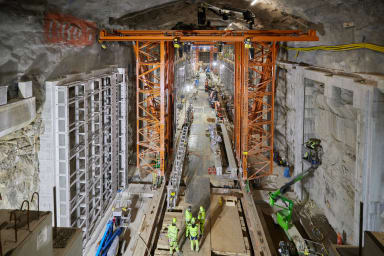Climate and energy
NCC works with focus and determined manner to eliminate greenhouse gas emissions from the entire value chain, increase energy efficiency and enable adaptation to climate change. ‘Climate and energy’ is one of the focus areas in NCC’s sustainability framework.
Priority areas
Concrete
NCC works on the basis of a Group-wide roadmap for climate-neutral concrete construction. This roadmap is in line with other national and international roadmaps. The work has two phases: minimize and transform. The first phase has three main perspectives: the right concrete in the right place, minimizing the amount of cement in concrete and minimizing the volume of concrete. Transformation is about identifying initiatives and technologies that can have a longer-term impact towards achieving the goal of climate neutrality.
Steel
Reducing the climate impact of rebar requires us to consciously source from producers who provide products with a lower climate impact. Environmental Product Declarations for materials (EPDs) are used in the evaluation of suppliers to assess whether they meet our own and our customers’ requirements.
Asphalt
NCC works in several areas of its asphalt production to reduce emissions: converting asphalt plants to run on biofuel, developing asphalt products with a lower climate impact (for example focusing on biofuel, mixing in recycled asphalt and lower temperatures) and replacing fossil bitumen with bio-based binders in the asphalt.
Transportation
Key measures to reduce the climate impact of transport include: Optimized logistics chains and efficient transports so that the total amount of transport activity can be reduced. Ecodriving and avoidance of idling, as well as electrification of vehicles and machines.
Increase energy efficiency
Central to our efforts to reduce our climate footprint is energy efficiency in processes and production and replacing fossil energy sources with renewable ones. NCC’s target is to only purchase fossil-free electricity and primarily renewable electricity. In 2023,
the portion of renewable electricity was 95 percent (95) of the total consumption of electricity. Carbon emissions related to purchased fuels, and electricity, district heating and district cooling, have been reduced continuously since 2015.
Key initiatives in the area of energy include:
- Continued energy efficiency improvements in the operations.
- Energy efficiency in property development operations. The requirement is for at least 25 percent better energy performance compared with regulations and local energy production in all projects.
- Increased mix of renewable fuel for machinery, in addition to electrification
Electrification
NCC is working to expand the electrification of machines and tools, as well as entire production sites, in order to cut fossil emissions. Key measures include:
- Electrification of mobile stone crushers, which will deliver extensive energy efficiency gains.
- Projects that are run with zero-emission machines and electrified transport in all countries.
- Continued testing and implementation of electric machines for paving work.
Expertise in building for climate adaptation
Part of NCC’s offering is to implement projects with the direct aim to achieve better climate adaptation. This could involve building projects to manage stormwater and heavy rainfall in urban areas, protecting shorelines and ports, and constructing residential areas so they can handle large amounts of rain. NCC also offers customers expertise on how projects can be designed to adapt to a changing climate.


